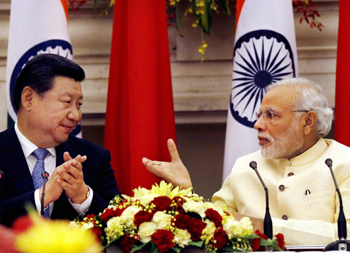Beijing, Oct 10: Ahead of President Xi Jinping's visit to India, China today said it is "ready" for talks with India on its entry into the NSG but defended extending a hold on India's bid for a UN ban on JeM chief Masood Azhar, saying Beijing is opposed to anyone making "political gains in the name of counter-terrorism".
 Briefing media here on Xi's visit to India this week to take part in the BRICS Summit in Goa, China's Vice Foreign Minister Li Baodong again harped on the need to build consensus over the admission of new members in the 48-member Nuclear Suppliers Group (NSG).
Briefing media here on Xi's visit to India this week to take part in the BRICS Summit in Goa, China's Vice Foreign Minister Li Baodong again harped on the need to build consensus over the admission of new members in the 48-member Nuclear Suppliers Group (NSG).
Asked if any progress on the issue of India's admission into NSG can be expected in the meeting between Xi and Prime Minister Narendra Modi on the sidelines of the BRICS Summit, Li said NSG rules stipulate consensus among the members to admit new ones.
"These rules are not to be decided by China alone. On the issue, China and India have maintained good communication and we are ready to continue consultations with India to build consensus and we also hope India can go to other members of the NSG as well," Li said replying to a question on China's reservations on India's admission to the elite nuclear trading club.
"In this aspect we are also ready for discussions with India to explore possibilities but things need to be in keeping up with procedures, norms and regulations of the NSG. On this issue, China position is consistent. That is why China has often said international law must be observed," he said.
Xi will travel to Goa to attend the BRICS Summit scheduled to held between October 15-16. The BRICS grouping consists of Brazil, Russia, India, China, South Africa. While India has blamed one country, without naming China, for stalling its membership in the NSG, both the countries held talks recently to iron out differences.
After talks with India, China also has held similar talks with Pakistan, which also applied for membership in the influential grouping. Replying to a question on criticism about China's move to stall India's bid for a UN ban on Azhar - head of Pakistan-based terrorist group Jaish-e-Muhammad, Li sought to justify Beijing's recent technical hold in the matter, saying: "China is opposed to all forms of terrorism."
"There should be no double standards on counter- terrorism. Nor should one pursue own political gains in the name of counter-terrorism," he said in a veiled reference to India, which is pressing for the UN ban against Azhar over his role in the Pathankot terror attack.
China had announced the extension of its "technical hold" on India's bid to get Azhar designated as a terrorist by the UN on October 1, days before it was to expire. The hold can continue for upto three months more.
During today's briefing, Li said counter-terrorism cooperation will figure in the BRICS Summit.
"On counter-terrorism, it is an important area for cooperation among BRICS members for political security. Cooperation on this front will enhance BRICS communication and coordination and will contribute to world peace and security. That is quite obvious," he said.
He said BRICS Foreign Ministers reached agreement on counter-terrorism during their meeting on the margins of the UN General Assembly last month.
"We hope and believe that this Goa summit will build on the past consensus and continue to strengthen cooperation in counter-terrorism and other issues of political security and contribute to world peace and security," he said.






Comments
Add new comment